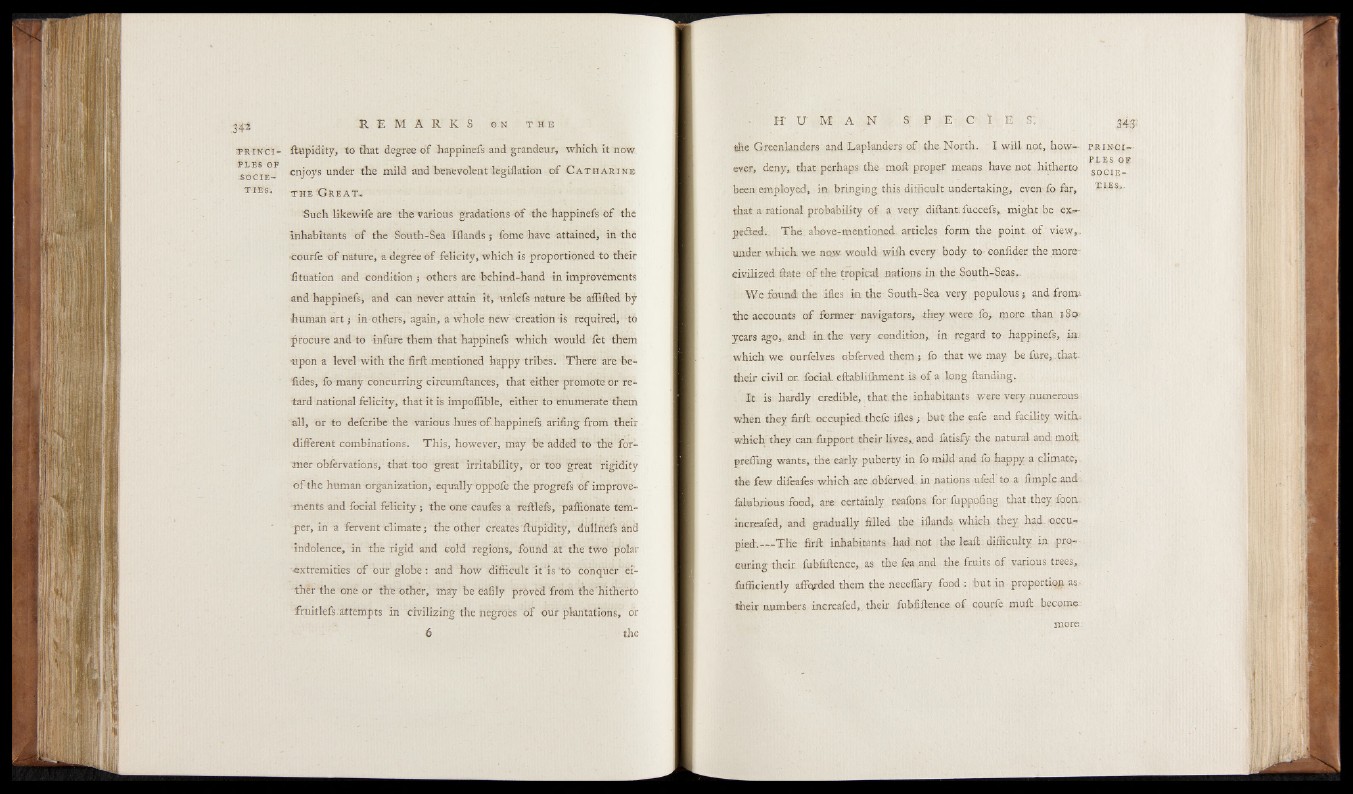
T R I N C I -
P L E S OP
■ S O C I E -
ma&Ê
ftupidity, to that degree o f happinefs and grandeur, which it now
enjoys under the mild and benevolent legiflation o f C a t h a r in e
th e -Gr e a t ,
Such likewife are the various gradations o f the happinefs o f the
inhabitants o f the South-Sea Iflands; fome have -attained, in the
-courfe o f nature, a degree o f felicity, which is proportioned to their
fituation and condition ; others are behind-hand in improvements
and happinefs, and can never attain it, unlefs nature be affifted by
human a rt; in others, again, a whole new Creation is required, to
procure and to infure them that happinefs which would let them
■ upon a level with the firft .mentioned happy tribes. There are be-
fides, Fo many concurring ciroumftances, that either promote or retard
national felicity, that it is impoffible, either to enumerate them
all, or to defcribe the various hues o f happinefs arifing from their
different combinations. This, however, may be added to the former
obfervations, that too great irritability, or too great rigidity
o f the human organization, equally oppdfe the progrefs o f improvements
and focial felic ity ; the one caufes a reftlefs, paflfonate temper,
in a fervent climate; the other creates ftupidity, dulln'efs and
indolence, in the rigid and cold regions, found at the two polar
•extremities o f our glo b e : and how difficult it is'to conquer either
the one or the other, may be ealily proved from the'hitherto
fruitlefs.attempts in civilizing the negroes o f our plantations, or
6 the
H U M A . N S P E C I E S’,
the Greenlanders and Laplanders o f the North. I will not, however,
deny, that perhaps thé moft proper means have not hitherto
been employed, in bringing this difficult undertaking, even fo far,
that a rational, probability of a very diftant. fuccefs, might be ex—
petted. T h e above-mentioned, articles form the point, of; view,,
under which we now would wilh every body to - confider the more
civilized ftate o f the tropical nations in the South-Seas-
W e found the ifles in the South-Sea very populous j and from’,
tiie accounts o f former navigators, they were fo, more than 180-
years ago,, and in, the very condition, in regard to happinefs, in
which we ourfelves obferved them 5 fo that we may be fure, that,
their civil or. fociaL eftablifhment is o f a long ftanding.
I t is hardly credible, that, the inhabitants were very numerous.-
when they firft. Occupied, thefe ifles j but the eafe and facility with,
which they can. fiipport their lives, and fatisfy the natural and. moft
prefling wants, the early puberty in fo mild and fb happy a climate,
the few difeafes which are .obferved. in nations ufed to a Ample and.
faLubrious food, are certainly reaföns for' fuppofing that they foon.
increafed, and gradually filled the iflands which they had. occupied.__
Th e firft inhabitants had. not the leaft. difficulty in procuring
their. fubfiften.ee,,. as the lea and the fruits of various trees,
fufficiently afforded them the neceffary food : but in proportion as-
their numbers increafed, their fubfiftence of courfe muff become.
PR IN C I PLES
o p
SQ C IE -
T IP S , .
more.